
Bristol Zoo was a zoo in the city of Bristol in South West England. The zoo's stated mission was to "maintain and defend" biodiversity through breeding endangered species, conserving threatened species and habitats and promoting a wider understanding of the natural world".

Twycross Zoo is a medium to large zoo near Norton Juxta Twycross, Leicestershire. The zoo has the largest collection of monkeys and apes in the Western World, and in 2006 re-launched itself as "Twycross Zoo – The World Primate Centre".

Taronga Zoo is a government-run public zoo located in Sydney, New South Wales, Australia, in the suburb of Mosman, on the shores of Sydney Harbour. The opening hours are between 9:30 a.m. to 4:30 p.m. Taronga is an Aboriginal word meaning "beautiful view".

Perth Zoo is a 17-hectare (41-acre) zoological park in South Perth, Western Australia. The zoo first opened in 1898 and by 2011 housed 1258 animals of 164 species and an extensive botanical collection. It is a full institutional member of the Zoo and Aquarium Association (ZAA) and the World Association of Zoos and Aquariums (WAZA).
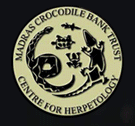
The Madras Crocodile Bank Trust and Centre for Herpetology (MCBT) is a reptile zoo and herpetology research station, located 40 kilometres (25 mi) south of the city of Chennai, in state of Tamil Nadu, India. The centre is both a registered trust and a recognized zoo under the Wildlife (Protection) Act, 1972 and comes under the purview of the Central Zoo Authority, Ministry of Environment, Forest and Climate Change, Government of India. It was established with the aim of saving three Indian endangered species of crocodile—the marsh or mugger crocodile, the saltwater crocodile, and the gharial, which at the time of founding of the trust were all nearing extinction.

The Mesker Park Zoo and Botanic Garden is a zoo that opened in 1928 in Evansville, Indiana, United States. It is located in Mesker Park on Evansville's northwest side and is run by the City of Evansville.

The blue iguana, also known as the Grand Cayman ground iguana, Grand Cayman blue iguana or Cayman Island rock iguana, is an endangered species of lizard which is endemic to the island of Grand Cayman. It was previously considered to be a subspecies of the Cuban iguana, Cyclura nubila, but in a 2004 article Frederic J. Burton reclassified it as a separate species because according to him the genetic differences discovered four years earlier between the different C. nubila populations warranted this interpretation. The blue iguana is one of the longest-living species of lizard.
The flora and fauna of Chennai are the plants and animals in Chennai, India.
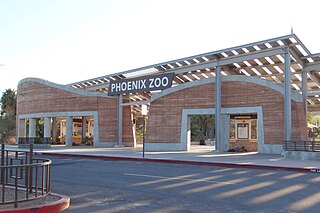
The Phoenix Zoo opened in 1962 and is the largest privately owned, non-profit zoo in the United States. Located in Phoenix, Arizona, the zoo was founded by Robert Maytag, a member of the Maytag family, and operates on 125 acres (51 ha) of land in the Papago Park area of Phoenix. It has been designated as a Phoenix Point of Pride.
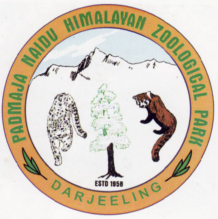
Padmaja Naidu Himalayan Zoological Park is a 67.56-acre (27.3 ha) zoo in the town of Darjeeling in the Indian state of West Bengal. The zoo was opened in 1958, and an average elevation of 7,000 feet (2,134 m), is the largest high altitude zoo in India. It specializes in breeding animals adapted to alpine conditions, and has successful captive breeding programs for the snow leopard, the endangered Himalayan wolf and the red panda. The zoo attracts about 300,000 visitors every year. The park is named after Padmaja Naidu (1900–1975), daughter of Sarojini Naidu. The zoo serves as the central hub for Central Zoo Authority of India's red panda program and is a member of the World Association of Zoos and Aquariums.
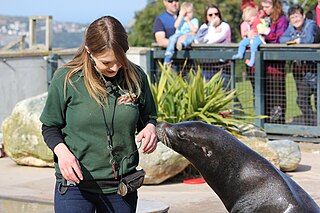
A zoo is a facility in which animals are kept within enclosures for public exhibition and often bred for conservation purposes.

The Fiji crested iguana or Fijian crested iguana is a critically endangered species of iguana native to some of the northwestern islands of the Fijiian archipelago, where it is found in dry forest on Yaduataba, Yadua, Macuata, Yaquaga, Devuilau, Malolo, Monu and Monuriki.
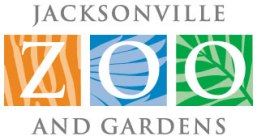
The Jacksonville Zoo and Gardens, located in Jacksonville, Florida, sits at the mouth of the Trout River, near where it flows into the St. Johns River. The zoo occupies approximately 122 acres (49 ha) and has over 2,000 animals and 1,000 plant species in its collection. The zoo has grown from its modest beginnings in Springfield to be considered one of the city's premier attractions, with more than one million visits annually.

Newquay Zoo is a zoological garden located within Trenance Leisure Park in Newquay, England. The zoo was opened in Cornwall on Whit Monday, 26 May 1969 by the local council. It was privately owned by Mike Thomas and Roger Martin from 1993 until 2003. In August 2003 Stewart Muir became the new Director and the zoo became part of the Whitley Wildlife Conservation Trust, alongside Paignton Zoo and Living Coasts. The zoo is part of a registered charity, and was awarded various South West and Cornwall 'Visitor Attraction of The Year' and 'Sustainable Tourism' awards for excellence in 2006, 2007 and 2008. Newquay Zoo is now run as part of the Wild Planet Trust, the new name for the Whitley Wildlife Conservation Trust.

Orana Wildlife Park is New Zealand's only open-range zoo, sitting on 80 hectares of land, located on the outskirts of Christchurch. It opened in 1976, and is owned and operated by the Orana Wildlife Trust, a registered charity. The aims of the Trust are to provide quality recreational opportunities for local people and visitors to Christchurch; conserve endangered native and exotic wildlife; educate visitors about environmental and conservation issues; and support research relating to endangered animals.
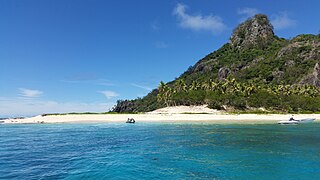
Monuriki is a small, uninhabited island situated off the coast of Viti Levu in the Fiji Islands, in Melanesia in the South Pacific Ocean. Monuriki is part of the Atolls islands, and related to a group of three islets in the larger group of islands known as the Mamanuca Islands. This coral and volcanic island is the smallest islet and the southernmost of a small group of three islets, west of Tavua.

Bristol Zoo Project, formerly known as Wild Place Project, is a wildlife conservation park in South Gloucestershire, United Kingdom. It is run by Bristol Zoological Society (BZS) and was the sister site of Bristol Zoo Gardens until closure of that site in 2022. In summer 2023, Wild Place Project rebranded as "Bristol Zoo Project" following the transition of Bristol Zoo Gardens from their Clifton site.

Wild Planet Trust, formerly known as the Whitley Wildlife Conservation Trust (WWCT), is a registered charity, set up to run Paignton Zoo after the death of its founder, Herbert Whitley, who established the zoo on his estate at Primley, Paignton in Devon in the 1920s.

The Folly Farm Adventure Park and Zoo, situated to the north of Saundersfoot and Tenby in Pembrokeshire, is a visitor attraction in Wales with around 500,000 visitors each year. Initially a farm attraction, the park is now also home to an indoor vintage funfair, a zoo with over 200 different species of animal and extensive indoor and outdoor adventure play areas.
William Gaylord Conway was an American zoologist, ornithologist and conservationist.



















